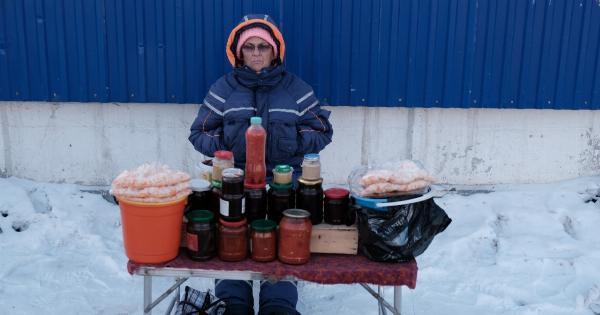As the winter season approaches, it can be tempting to indulge in a variety of delicious treats and comfort foods. However, it is important to be mindful of our choices and strive to maintain a healthy lifestyle even during this festive time of year.
While it is okay to enjoy an occasional indulgence, there are certain winter treats that should be avoided or consumed in moderation to prevent adverse effects on our health. Let’s take a closer look at some of these treats and why they may not be the best option for a healthy winter.
1. Hot Chocolate with Whipped Cream
Hot chocolate is a popular winter beverage that brings warmth and coziness. However, many hot chocolate varieties available in cafes and restaurants are loaded with added sugars and unhealthy fats.
The addition of whipped cream further increases the calorie and fat content. Instead of indulging in these sugary concoctions, opt for a homemade version using unsweetened cocoa powder, a natural sweetener, and low-fat milk or a plant-based alternative.
This way, you can enjoy a healthier and equally satisfying cup of hot chocolate without the guilt.
2. Deep-Fried Foods
During the winter season, deep-fried foods such as samosas, pakoras, or doughnuts are commonly consumed as a comfort snack.
While these treats may be tempting, they are high in unhealthy fats and can contribute to weight gain and increased cholesterol levels. Instead of indulging in deep-fried foods, try healthier alternatives such as baked or air-fried options. This way, you can still satisfy your cravings while reducing the negative impact on your health.
3. Eggnog
Eggnog is a traditional holiday beverage that often contains high amounts of sugar, eggs, cream, and sometimes alcohol. This creamy treat is delicious but can be detrimental to your health if consumed in excess.
The high sugar content can lead to weight gain, and the high fat content can raise your cholesterol levels. If you enjoy the flavor of eggnog, consider making a healthier version using low-fat milk or a plant-based milk alternative, and using a natural sweetener like honey or maple syrup.
4. Butter-Laden Baked Goods
Winter is the time for festive cookies, cakes, and pies, but these goodies are often made with excessive amounts of butter and refined flour. While they may be delicious, they can wreak havoc on your waistline and overall health.
Instead of completely depriving yourself of these treats, consider making healthier versions using whole wheat flour, alternative sweeteners, and healthier fats like avocado or coconut oil. You can also experiment with reducing the sugar content without compromising on taste.
5. Peppermint Bark
Peppermint bark is a favorite holiday treat for many, but it is usually loaded with sugar and high in calories. This sweet indulgence can quickly add up and contribute to weight gain and higher blood sugar levels.
Instead of consuming peppermint bark, try making your own at home using dark chocolate with a higher cocoa content and natural peppermint extract. Dark chocolate is rich in antioxidants and has various health benefits when consumed in moderation.
6. Canned Soups
Canned soups may seem like a convenient option during the winter season, but they are often high in sodium and artificial additives. Excessive sodium intake can lead to water retention, high blood pressure, and other health issues.
Instead of opting for canned soups, consider making homemade soups using fresh vegetables, lean proteins, and natural seasonings. Homemade soups are not only healthier but also more flavorful and can be easily customized according to your preferences.
7. Sugary Cereal
During the winter months, many people tend to consume sugary cereals as a quick and easy breakfast option. However, these cereals are typically highly processed and packed with added sugars.
They can cause a rapid spike in blood sugar levels and leave you feeling hungry soon after. For a healthier breakfast alternative, opt for whole grain cereals that are low in sugar or choose to prepare a nutritious breakfast using ingredients like oats, fresh fruits, and nuts.
8. Holiday Cocktails
Celebrations and holiday parties often involve the consumption of alcoholic beverages, which can be high in calories and detrimental to our health.
Cocktails made with sugary mixers and syrups can contribute to weight gain and increase the risk of developing chronic diseases. If you choose to indulge in an alcoholic beverage, opt for lighter options such as a glass of wine or a vodka soda with fresh lime juice. Remember to consume alcohol in moderation and stay hydrated.
9. Sugar-Sweetened Beverages
While it’s essential to stay hydrated during the winter season, it’s important to choose beverages wisely. Sugar-sweetened beverages like soda, flavored iced teas, and energy drinks are loaded with added sugars and empty calories.
These drinks can lead to weight gain, tooth decay, and an increased risk of developing various health conditions. Instead, opt for healthier alternatives like herbal teas, infused water, or unsweetened beverages that will quench your thirst without the negative health consequences.
10. Store-Bought Pie Crusts
Pies are a quintessential winter dessert, but store-bought pie crusts are often made with unhealthy fats, refined flour, and preservatives. These packaged crusts can be high in trans fats, which are detrimental to heart health.
Instead of using store-bought crusts, consider making your own using whole grain flours, healthier fats like olive oil or coconut oil, and natural sweeteners. Homemade crusts not only provide better nutritional value but also taste fresher and more flavorful.
Conclusion
While it’s tempting to indulge in winter treats, it is important to consider the impact they have on our overall health and well-being.
By avoiding or moderating the consumption of certain treats like hot chocolate with whipped cream, deep-fried foods, eggnog, butter-laden baked goods, peppermint bark, canned soups, sugary cereals, holiday cocktails, sugar-sweetened beverages, and store-bought pie crusts, we can maintain a healthy lifestyle even during the winter season. Remember, moderation is key, and finding alternative recipes that prioritize nutrition without compromising on taste can help us enjoy the festive season while embracing our health-conscious choices.































